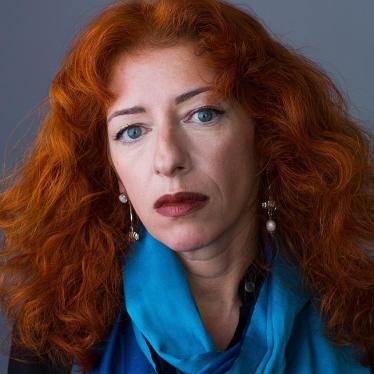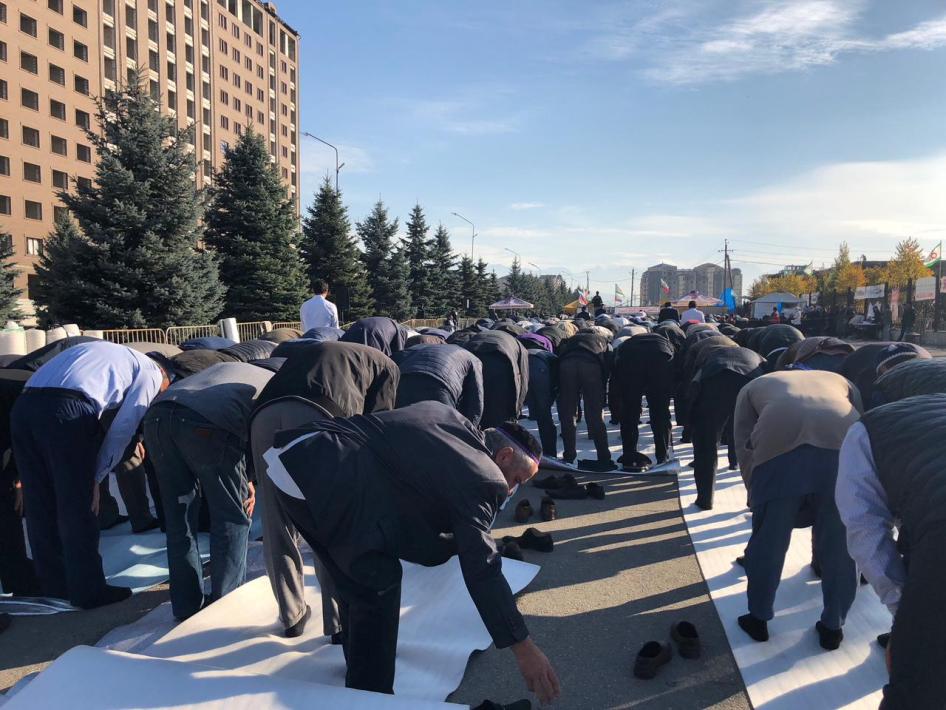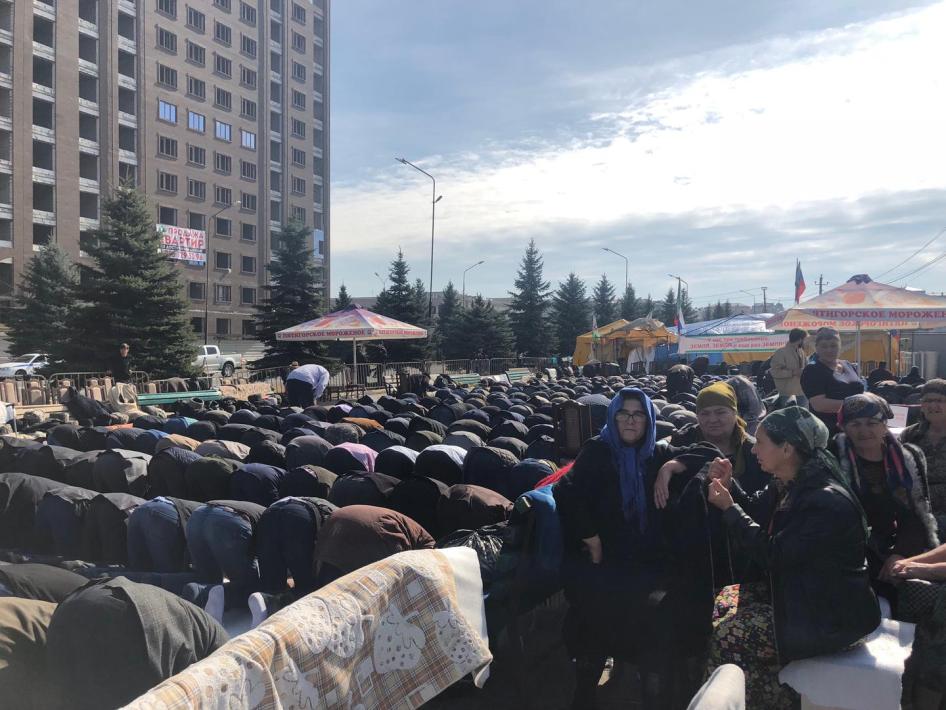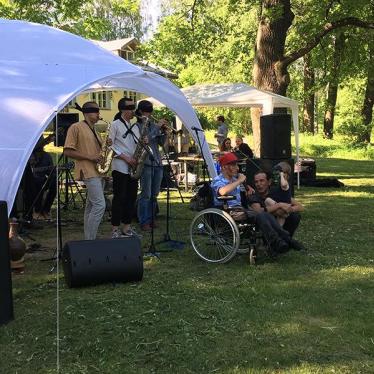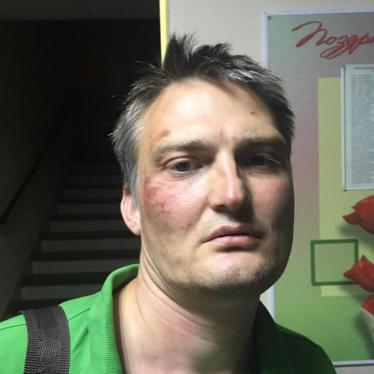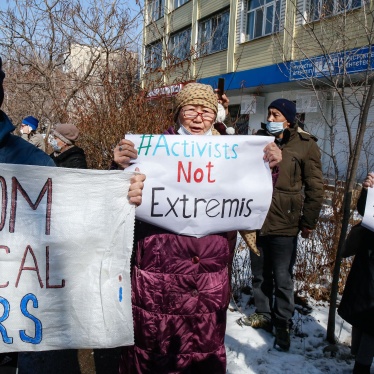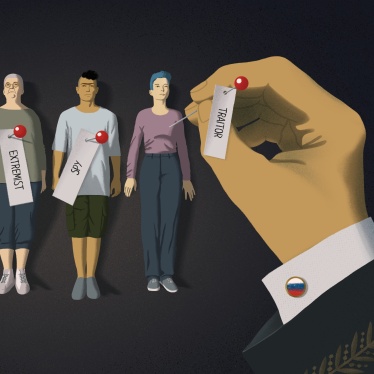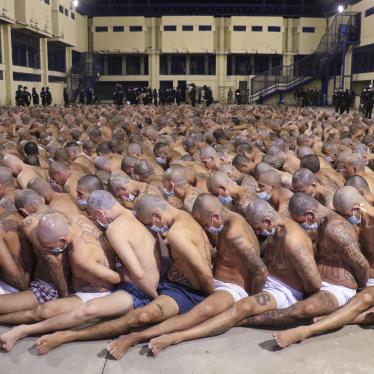As the call to prayer rolls over of Magas, the capital of Ingushetia, Russia’s smallest North Caucasus republic, hundreds of men busily unroll plastic mats, turning the central square into an open-air prayer ground. “Allahu Akbar!” The men kneel, get up, and kneel again — a sea of kneeling men stretching out in front of me. Done with the prayer, they roll back the mats. Then they continue with the rally that has gathered them here out on the square. to call for the annulment of a recent agreement on the demarcation of Ingushetia’s administrative border with neighboring Chechnya that will see Ingushetia lose territory.
Estimates vary on how much territory would be lost to Chechnya. Official estimates put it at five per cent of Ingushetia’s entire current territory, totaling 1,240 square miles. Independent experts estimate seven per cent, and some of the protest organisers say the loss is up to 10 percent.
During the Soviet era, Chechnya and Ingushetia were one republic. An interim agreement on the border reached in the early 1990s, after Chechnya sought independence from Russia while Ingushetia chose in a referendum to remain in Russia, was revised on several occasions, but the demarcation was never finalised.
As many as 10,000 people have joined the rally on some days. This is unprecedented for Ingushetia, with its population of just over 450,000.
Why such great numbers? People in Ingushetia generally view the land as sacred and the loss of every square inch is painful. Particularly so because Ingushetia lost land after the trauma of deportation of the Ingush during the Stalin era and the brief but fierce armed conflict with the neighbouring region of Ossetia in the early 1990s.
However, Ingushetia’s leadership did not inform the public that the negotiations were taking place until the outcome was already a done deal. The protest, which has been on-going for close to two weeks, was largely triggered by this stark lack of transparency in decision-making on an issue of great public importance.
As I walk through the protest site talking to people at random, this is precisely what I hear being repeated, passionately. “They decided on our behalf without even letting us know!” – “No one bothered asking our opinion!” – “It is as if we did not exist.” – “We are here to show them that our voices matter!”
The words I heard are strikingly similar to what I heard in Moscow in autumn 2011 when mass peaceful protests broke out after then-prime minister Vladimir Putin announced that he and then- president Dmitry Medvedev had decided “several years ago” that they would swap places in the next presidential election.
Thousands of people have come together in Ingushetia to make their voices heard. While the older people, in full accordance with local traditions, are given the place of honour and priority at the microphone, the younger ones are handling all the logistics. The square is meticulously clean, a small field kitchen operates in the back, with food, water and hot drinks available to everyone. Local Red Cross volunteers are at the ready with medical assistance. With official media either ignoring the protest or attempting to smear the organizers, volunteer cameramen work around the clock, posting their videos online. Mobile internet was cut off in Magas at the start of the protest, as the local authorities strove to limit social media coverage in real time, but the younger bloggers have long found ways to get around it.
Students, academics, public servants, members of Ingushetia’s parliament, civic activists, opposition politicians, members of the council of the elders, and local religious leaders have united to make clear to federal authorities that the people of Ingushetia want the agreement suspended and expect to be part of the decision-making processes. Local police join the protesters for regular prayers and say quietly that they won’t use force against the demonstrators even if ordered to.
On 6 October, the third day of the rally, with thousands of people already protesting, men who claimed they were security officials kidnapped a researcher from Amnesty International who was in Ingushetia to monitor the protest. They drove him to a deserted area, beat him, forced him to strip, subjected him to mock executions, and finally released him late at night, telling him “never come back, and don’t write filth about Ingushetia.” Most likely, the kidnappers intended to use his example to discourage other “outsiders” from traveling to Ingushetia and reporting on the rally, but their depraved intimidation tactics have not seemed to work. Interest in the dramatic developments in Magas is rising, and an increasing number of journalists and other observers are coming to report on the protest.
Whatever the outcome, the protesters clearly made federal authorities pay attention. This week, the organisers will have their second meeting with President Putin’s emissary in the North Caucasus federal district. Putin also spoke to Ingushetia’s governor, Yunusbek Evkurov, stressing that no force should be used against the protesters and the government should be talking to them. The protest now continues with official authorization.
The scale of this protracted protest is unprecedented for Ingushetia, but also striking for contemporary Russia, where peaceful protests are routinely dispersed. In that context, Putin’s advice to Evkurov to “talk to people” and to use “methods… of democracy” comes across as quite ironic.
One thing is clear. The Kremlin is surprised by this popular movement. It has taken a pause and for once, at least for now, it’s listening.

